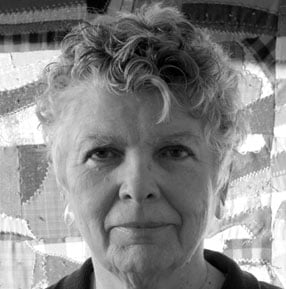The Subway Entrance
He was her guide. He lived in hell. Every day he thought
he was dead. Years after he's died, she thinks it's him stumbling
drunk through the subway turnstile. Just the two of them
on the platform. He asks her for money, pennies for passage:
In the nursing home, a palsied woman guards the door.
She asks: Are you coming back? Everyone in or out
must answer her. Don't leave me here. Come back.
Beatrice lies to get past her outstretched shaking hand.
Her father knows she's leaving him today. He waits.
His dying head turns and roams the air. One tear
slides from his right eye, rheumy clear regret.
What has he meant? His shouts at the TV asked for death,
the dogs set ravening. His way in the woods was delicate
wherever he stepped.
Before he takes her there,
he shows the snake's rattle in his desk drawer, stretched
out like a watch fob, a pocket charm to protect,
a souvenir of the biggest one he's killed yet. He calls
to her in the woods, Look where you put your feet.
Her favorite place is low, the watery creek branch,
sand rippled like snake tracks. His place is high, a stand
of longleaf pine. In that long hallway, light flashes
as his axe bites at a tree's distortions, rotted cankers,
excrescences. His gloved hands run rough up and down
the bark flanks. Her mouth fills with tincture of turpentine.
On the tree's face, teardrops of rosin harden and shine.
She remembers which way the bed faced. Climbing
up beside him. No touching, but excitement. Like getting on
a train and stories flash by. Him throwing tires like horseshoes
in Michigan, him wrestling alligators in a Florida swamp.
His words clack like wheels over rails, then he's snoring.
She thought they were going together. Left behind.
The one who waits, the one who's going nowhere
in the stuffy room, with his sweat, cigarettes, spittoon.
No way to tell her story.
He carries her on his back
across the river. Sun sparkles under her feet,
and the terror of what lies under. She climbs down
to stand with him at the edge, where sandy ground
gives way to water. His ruined land behind her,
the failed sealed mouths of coal mines, the silver dollars
like tarnished moons in men's hands on election night.
She knows she is leaving him today. She asks,
Will you die before I come back? He says he guesses so.
He sees her tears, he says, Don't take it so hard.
He promised his mother he'd come back. He never
promised her.
In the past they step to the edge of the river
and the water forgives.
He never promised to meet her
in the city, any one of the cities he stumbled through:
On foot in L.A. in 1931, looking for a job.
Left the trailer at dawn, walking. Sold cut flowers
on a corner, picked up golf balls at a driving range,
nickel a bucket. At the locked gates of the aircraft plant
daydreamed a flight above the city like a silver angel.
Asked for yard work at a house. The owner promises tomorrow.
He holds his hands out, and says, as if to a brother, a sister,
Don't you forget me.
Credit
From Walking Back Up Depot Street, copyright © 1999 by Minnie Bruce Pratt. Reprinted by permission of the author. All rights reserved.
Date Published
01/01/1999

